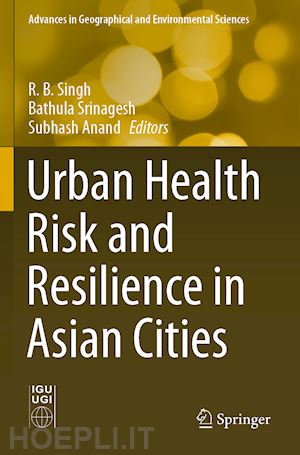

Questo prodotto usufruisce delle SPEDIZIONI GRATIS
selezionando l'opzione Corriere Veloce in fase di ordine.
Pagabile anche con Carta della cultura giovani e del merito, 18App Bonus Cultura e Carta del Docente
This book focuses on understanding urban vulnerability and risk mitigation, advancing good health and wellbeing, and analysing resilience measures for various Asian cities. Today, cities are the dominant human habitat, where a large number of environmental, social, cultural and economic factors have impacts on human health and wellbeing. Cities consist of complex, dynamic, socio-ecological, and technological systems that serve multiple functions in human health and wellbeing. Currently half of Asia’s population is urban, and that figure is expected to rise to 66 percent by 2050. Since urban areas are often most vulnerable to hazards, the people living in them need good health infrastructure facilities and technological support at various scales. As such, the need of the hour is to enhance the adaptive capacity, strengthen resilience, reduce vulnerability, and take risk mitigation measures in urban areas, which requires a systematic approach based on science–policy interface that istransformative, trans-disciplinary and integrative for a sustainable urban future. Global sustainable development goals are closely tied to urban human health and wellbeing: (1) the third of the United Nations’ Sustainable Development Goals is to “Ensure healthy lives and promote wellbeing for all at all ages” and (2) the eleventh is to “Make cities inclusive, safe, resilient and sustainable”. By addressing these goals, this book offers a highly useful resource for anyone concerned with healthy and resilient cities in Asia, today and tomorrow.
Prof. R.B. Singh is a professor of geography at Delhi School of Economics, University of Delhi; the Secretary General and Treasurer of the International Geographical Union (IGU); the chair of the Council for Scientific and Industrial Research (CSIR) – Central Food Technological Research Institute, the Government of India; and a member of the International Council of Science (ICSU) and the scientific committee on Urban Health and Wellbeing. He was awarded the prestigious Japan Society for the Promotion of Science Research Fellowship and has presented papers and chaired sessions in more than 40 countries. He has published 14 books, 35 edited research volumes and more than 215 research papers in national and international journals (e.g. Climate Dynamics, Current Science, Advances in Meteorology, Physics and Chemistry of the Earth, Agriculture, and Ecosystem and Environment). He is the editor of the Springer series Advances in Geographical and Environmental Sciences and Sustainable Development Goals.
Professor B. Srinagesh is a professor of geography at Osmania University, Hyderabad. He has a total of 17 years of research experience and has published numerous papers. He was the principal investigator for a major project on Globalization, Climate Change and its Impact on Health – Health Mapping of Andhra Pradesh, sponsored by the University Grants Commission (UGC) 2010–2013 and was awarded a UGC postdoctoral fellowship for 2015–2017. He organised the IGU India Conference on Urban Health and Wellbeing as well as the Committee on Data for Science and Technology (CODATA) Training Programme for young South Asian researchers with the support of the Chinese Academy of Sciences.
Dr Subhash Anand is currently an associate professor of geography at the Department of Geography, Delhi School of Economics, University of Delhi. With over 20 years of teaching and research experience, he has published four books, as well as numerousresearch papers and book chapters. He has participated in a number of conferences and workshops and led the Indian delegation of the Indian Council of Social Sciences and Japan Society for Promotion of Sciences (ICSSR-JSPS) joint research programme.











Il sito utilizza cookie ed altri strumenti di tracciamento che raccolgono informazioni dal dispositivo dell’utente. Oltre ai cookie tecnici ed analitici aggregati, strettamente necessari per il funzionamento di questo sito web, previo consenso dell’utente possono essere installati cookie di profilazione e marketing e cookie dei social media. Cliccando su “Accetto tutti i cookie” saranno attivate tutte le categorie di cookie. Per accettare solo deterninate categorie di cookie, cliccare invece su “Impostazioni cookie”. Chiudendo il banner o continuando a navigare saranno installati solo cookie tecnici. Per maggiori dettagli, consultare la Cookie Policy.